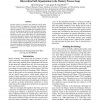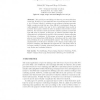5 search results - page 1 / 1 » Evolution-Based Discovery of Hierarchical Behaviors |
AAAI
1996
13 years 5 months ago
1996
Procedural representations of control policies have two advantages when facing the scale-up problem in learning tasks. First they are implicit, with potential for inductive genera...
TSE
2010
13 years 2 months ago
2010
—Discovering program behaviors and functionalities can ease program comprehension and verification. Existing program analysis approaches have used text mining algorithms to infer...
IAT
2003
IEEE
13 years 9 months ago
2003
IEEE
This paper defines an approach to simulation of natural systems, inspired by complex systems theory. A complex natural system is modeled as a multi-agent simulation system, agents...
ALIFE
2008
13 years 4 months ago
2008
Current analyses of genomes from numerous species show that the diversity of organism's functional and behavioral characters is not proportional to the number of genes that e...
BPM
2009
Springer
13 years 11 months ago
2009
Springer
The goal of process mining is to discover process models from event logs. However, for processes that are not well structured and have a lot of diverse behavior, existing process m...


